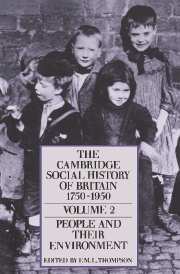3 - Work
Published online by Cambridge University Press: 28 March 2008
Summary
This chapter cannot hope to provide an exhaustive history of work over the period. Rather, it takes what is probably the major insight of recent scholarship on industrial capitalism, and attempts to work out some of the consequences of this insight. The realisation that the factory and the machine should form a part and not the whole of our picture of industrialisation is a relatively recent one. Coming to terms with the diversity and irregularity of capitalist development involves therefore a critical account of older notions of social and political change predicated on now questionable premises. It also necessitates the attempt in turn to relate such change to a more adequate notion of the economy and work experience, a relation that is itself revealed as problematic. The attempt to balance old and new accounts – for it may be a question of balance rather than simple substitution – must therefore be historiographical and theoretical, as well as empirical. In, broadly, the first half of the chapter an empirical approach predominates, as the principal features of work are delineated. Towards the close of section two, problems associated with newer perspectives are raised in a speculative manner, which steadily becomes more historiographical in approach. However, we shall begin at the beginning, namely what people worked at in the past.
- Type
- Chapter
- Information
- The Cambridge Social History of Britain, 1750–1950 , pp. 131 - 194Publisher: Cambridge University PressPrint publication year: 1990
References
- 6
- Cited by



